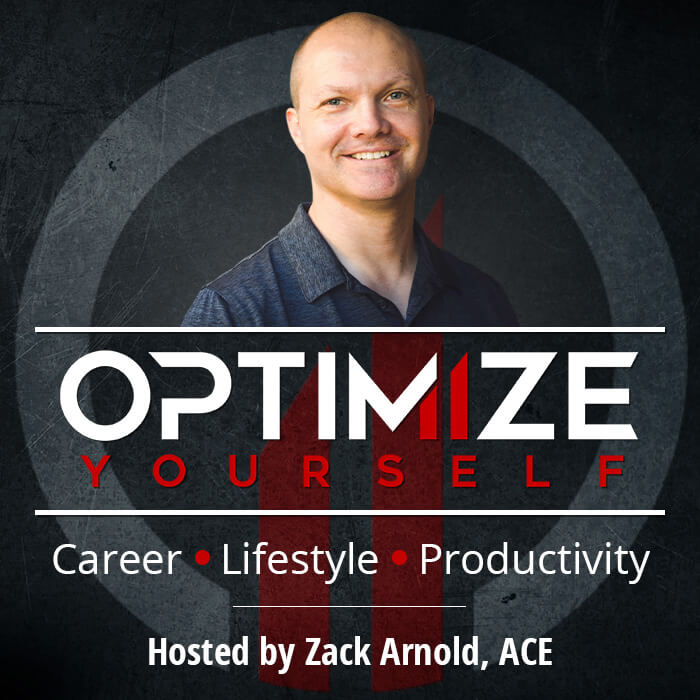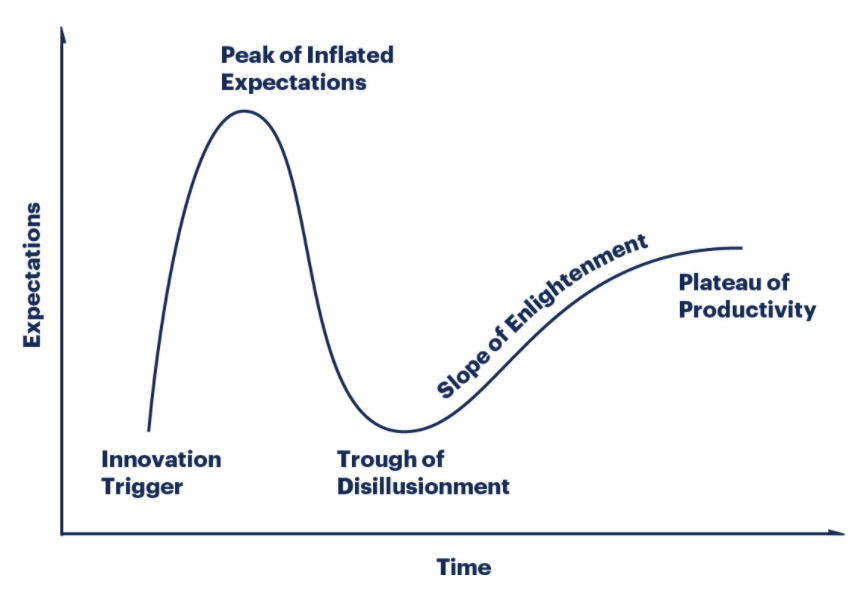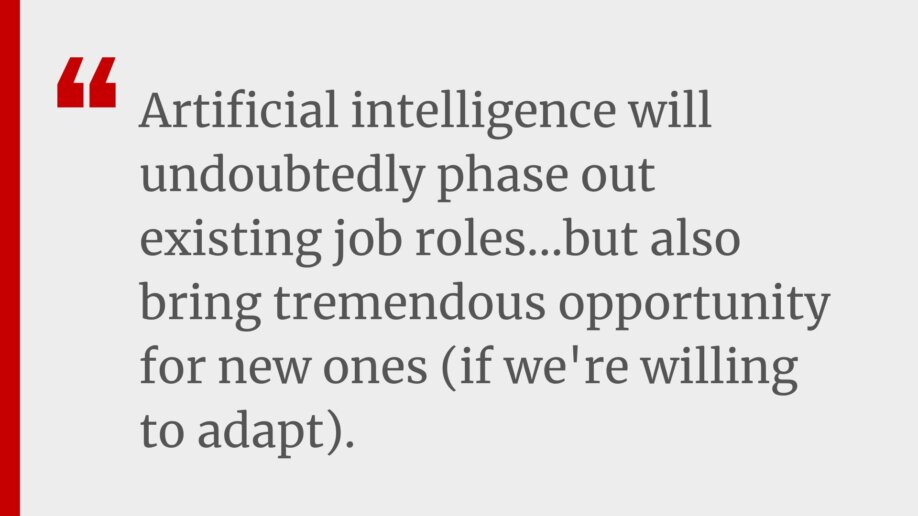

Zack Arnold
You are a "Jack of All Trades" AND a master of one (you just don't know it yet)
As I’ve stated in previous newsletters, I believe we’re witnessing the slow but inevitable transition of modern industrialized society from specialization (back) to generalization. And in this disruption I see tremendous opportunity not only for us as individuals but collectively as a society. And I’m not just talking about new ways to earn income using our existing skills (although there are plenty of those). I see the opportunity to build more fulfilling lives whereby our identities are no longer tied to our job titles.
Unfortunately not everyone agrees with the value of career diversification:
- This is the most depressing thing you’ve ever written…that AI is going to dictate our lives from now on.
- This is not the time or place to see a business opportunity! Personal empowerment is coming at the expense of the collective which spreads the idea we’re going to be diminished.
- I just want to create full-time, not become a jack-of-all-trades. I want to focus my energies, not scatter them all over.
I’d first like to clear up the confusion around why I believe career diversification is the wave of the future and how it helps us reconnect with who we are and how we bring value to the world beyond what it says on our résumés. (Résumés are a topic I’ll get into much more in depth in a couple weeks, btw.)
The first point to clarify is that I’m not saying our choices are binary, i.e. there are only two paths forwards:
- Path 1: We continue to specialize in a single craft or skillset and develop a high level of expertise…only to watch a lifetime of creative mastery get replaced by plug-ins and automation.
- Path 2: We generalize, spread our focus thinly across multiple skillsets, accept we need five different jobs to survive, and thus we become a “Jack of all trades, master of none” devaluing our skills, our industry, and thus ourselves.
In the current disruption I see tremendous opportunity that few others seem to recognize that combines the best of both paths:
- Path 3: Generalization provides us the freedom to simultaneously become a Jack of all trades AND a master of one.
Yes, I believe we can have our cake and eat it too.
The second point I need to clarify is my statement that “artificial intelligence will undoubtedly shrink the workforce.” I now realize I have communicated this unclearly. History has proven over and over that rapid technological advancement often creates new job opportunities, an assertion I agree with 100%.
So to clarify this statement, I should instead say:
“Artificial intelligence will undoubtedly phase out existing job roles…but also bring tremendous opportunity for new ones (if we’re willing to adapt).”
History Repeats Itself…
When the entertainment industry permanently transitioned from shooting 35mm film to exclusively shooting digitally (the timing is murky, but for the sake of argument let’s call this 2012), the workforce of 35mm film camera operators was decimated. You could most likely list on a single hand the number of people in 2023 who make a living as a 35mm film camera operator in Hollywood (and they all probably work for Christopher Nolan).
However, if you compare the number of people who made a living primarily as camera operators in 2012 (16,4101) with the number of people who make a living primarily as a camera operator today (22,9702), the transition from film to digital helped expand the job market of camera operators by almost 40%! With more advanced technology came cheaper cameras, thus the ability to shoot with more of them.
I distinctly remember editing season 4 of Burn Notice, the first season that was shot digitally (as opposed to super 16mm). The amount of dailies shot on a daily basis was 2-3x the volume of film because they were shooting not with just one camera but two for almost every scene…and with some scenes they were shooting with 3 or 4 cameras. And with the addition of each camera came not only an operator but a host of other crew members (not to mention the additional number of post-production personnel required to process the increased volume of digital metadata).
With every exponential change in technology comes a wave of panic, misunderstanding, and ultimately inflated expectations and hype – all of which can be summed up in a simple graph called The Gartner Hype Cycle.

Guess where we are right now???
With the latest introduction of advanced language models and generative AI we immediately presume everyone is going to be replaced by technology. We will soon realize that AI will not be able to do everything for everyone at the push of a button, and it will still largely require human intervention to provide optimal results. All of those hyped expectations will not be met, and we’ll be in the trough of disillusionment. As we continue to adapt, however, we’ll ultimately climb the slope of enlightenment and develop a symbiotic relationship where AI is just the next tool to make us more productive and enhance our creativity (as long as we ruthlessly fight for legal protections from plagiarism and the abuse of this technology by corporations trying to save a buck…a topic for another day).
I see the latest wave of artificial intelligence having a similar effect on creatives that digital did to camera operators whereby many existing job roles that are centered around highly specialized, repeatable, and data-driven tasks will virtually disappear…but ultimately we’ll end up needing even more people to match the insatiable demand to come for highly customized content.
The 35mm camera operators who identified as “film camera operators” and refused to adapt to new technology became obsolete.
However, the 35mm camera operators who instead chose to focus on their much more important creative abilities to operate any camera, choose the right lens for the right emotion, and frame a shot in such a way to tell a specific story simply had to learn how to adapt their specialized skills with new technology.
Jack of All Trades…and Master of One
With this disruption comes our opportunity to return to the essence of what sets us apart from the machines and makes us irreplaceable: Our creativity.
If we are willing to diversify our technical skills and embrace AI (with proper regulations), I believe this new technology allows us to learn so many new skills and crafts with a much shorter learning curve, all while bringing value in our own unique and irreplaceable ways.
Had you asked me ten years ago, “What do you do for a living?” I would have responded with “I edit television.”
Now if I were to ask me how I making a living, I would respond with “I connect seemingly random story points and ideas and communicate them in an easy-to-understand, entertaining, and emotionally engaging way.”
Simplifying the complex is my speciality.
What has given me a tremendous amount of job security is not my speciality, however, but instead how I have diversified my singular speciality into an array of different ways to generate income that includes editing, podcasting, coaching, writing, and speaking.
On the surface I’m a Jack of All Trades.
Underneath the surface I’m a master of one.
If editing Cobra Kai were the only way to support my family right now, I’d be screwed. But given how much I’ve diversified the ways I can bring value to the world with my one specialty, I can still support my family in the midst of this storm.
You Are Not Your Résumé
If you’re concerned artificial intelligence is going to replace your job, it’s time to stop focusing on the job titles on your résumé and instead focus on how you uniquely bring value to the world.
What is the essence of what you do best that has made you valuable in every job you’ve exceled at in the past?
What would others say are your greatest strengths?
What valuable knowledge or skills do you possess that few others have?
What would you do for a living even if you weren’t getting paid?
What is your ‘Zone of Genius’?
I look forward to helping you find answers to what I believe are the most important questions that will allow you develop career resilience in the face of AI.

